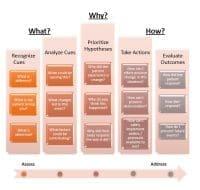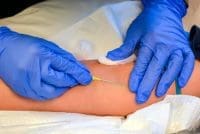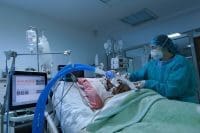“Nursing students have a responsibility to model civility and encourage respectful social discourse. Collaborating with faculty and taking a leadership role in co-creating classroom and clinical norms have a significant and positive impact on providing a safe, open environment to express diverse views.” ~ Cynthia Clark
I have been a nurse educator for 10 years and a clinical nurse for over 20 years. During my career, whether in clinical nursing practice, teaching, or in my research, I keep coming back to one concept: civility.
With my senior nursing students, I emphasize the importance of the “soft skills” when it comes to patient care. Nursing programs prepare them with all the “hard skills” they need; however, unpredictable clinical learning environments, incivility within academic and clinical environments, and the cultural assumption that nurses are supposed to suspend their humanity in order to be professional, can often leave them feeling lost. I see an important part of my job as teaching future nurses coping mechanisms and empowering them to speak up for themselves and for their patients.
I love to hear from former students, especially when they can talk about how they have applied the lessons learned in my class to the real world of nursing. One student, Maria Tabago,took these lessons to the next level offering an example of civility we all can learn from. In this article, Maria and I discuss her initiative and how students can practice civility by supporting one another.
Preparing for clinical rotation and problem solving
First, I’ll set the stage, then we’ll hear from Maria in her own words. To prepare students for their pediatric clinical rotation, I conduct a formal student orientation in the classroom and in the clinical area. In the classroom I review nurse practice standards, professional and ethical conduct, and discuss the crisis of incivility in nursing. In the clinical area the students and I review the mission and vision of the organization and our university and students discuss how they can integrate and align academic and developing professional values into the framework and co-create clinical norms.
As a clinical instructor, I facilitate this process by supporting students in identifying ways they can individually and collectively promote safe and civil learning environments. These discussions often result in students identifying specific actions they can take, such as being an effective communicator, being open and honest, being willing to listen, being engaged in learning, respecting others, being optimistic and seeking opportunities to help.
During the end of this semester’s wrap up, Maria shared with me that she wished she had been prepared better for her pediatric rotation. Because our nursing curriculum is concept-based, we don’t offer classes on pediatric nursing. Instead, pediatric nursing is threaded throughout the concept-based classes and treated as one stage of a person’s lifespan. In our meeting, I encouraged Maria to practice her problem-solving skills and think about how she could have been better prepared for her clinical experience. She had great ideas and I encouraged her to write them down. Well, I couldn’t have predicted what she would do next.
One day, about a month after graduation, I received an email from Maria. There was a document attached. It was an encouraging letter, a class gift, to the upcoming senior class with helpful information and tips for success in their pediatric clinical rotation.
Here’s the letter:
What we wish we knew before pediatric clinical…
Initiated by: Maria Tabago
Special thanks to my classmates from the William Paterson University Nursing Class of 2019.
Dear Class of 2020,
We are doing you hard working, eager students a big favor by providing you some wisdom that not only will help you with your pediatric rotation but, will prevent you from the embarrassment some of us have faced. The goal is for you to be able to impress your clinical faculty, nurses and other staff members with your extensive knowledge, amazing work ethic, and outstanding skills (especially if you’re interested in Pediatrics!), while preparing you to become the best future nurse ever! So here is some information and tips we learned throughout.
Some of you may think that some of these tips are common sense or you may already know these things. But sometimes, common sense is not so common.So make the most out of this and listen to us. Trust us.
Basic knowledge you want to master or review before starting clinical:
- Vital signs for all age groups
- Fluid requirements
- Erikson’s Developmental Stages
- Maslow’s Hierarchy of Human Needs
- Pediatric pain scales
- Common pediatric diagnoses, treatment plans and medications.
SIX TIPS FOR SUCCESS
Tip #1: Learn to observe and be detail-oriented!
- Know your patient’s weight—this is important because it relates to their fluid requirements and medication doses.
- Always make sure that the environment is free of clutter, the side rails are up, and emergency equipment is close by.
- WEIGH DIAPERS BEFORE THROWING THEM OUT! That’s how you measure urinary output in pediatrics.
- Look for and read your patient’s history and physical (H&P). You’ll learn A LOT about your patients this way.
- Learn to listen for and respond to call bells and IV alarms!
Tip #2: Remember that communication is KEY and work with the parents!
- Acknowledge the family members in the room. Pediatrics is very patient and family-centered care, so the people in the room are most likely involved in the patient’s care. Also, always keep in mind that the hospital is a big stressor for the parents and the child.
- Work on your therapeutic communication. You will be working with children, and they understand differently from adults. Base their needs on Erickson’s theory of developmental stages. It’s actually pretty accurate!
- Work on your Spanish. If you’re like most of us, our Spanish is muy “poquito.” Still, know how to say these phrases:
- “Hola, mi llamo es ____ y soy estudiante de enfermeria” (Hello, my name is ____ and I am a nursing student).
- “¿Cuántas onzas de formula bebió el bebé?” (How many ounces of formula did the baby drink?)
- “Le voy a dar a su bebe su medicina” (I will be giving your baby his medicine).
- “¿El bebé hizo pipí o caca?” (Did the baby pee or poop?) You can say this when they hand you dirty diapers.
- “¿Necesitas algo?” (Do you need anything?) or if you want to be fancy: “¿Hay algo más en lo que pueda ayudarte?” (Is there anything else I can help you with?)
If you already know Spanish, consider yourself lucky!
Tip #3: Know your stuff!
- Familiarize yourself with the most common pediatric diseases and medications so you know what to look for when you see your patient and you’ll be able to notice if anything is abnormal.
- Now… it’s not expected of you to master all the common pediatric diseases and medications (that would be super impressive though), but knowing them before clinical will save you tons of time looking them up (especially if you have more than 1 patient) and it will help you to pass your exams!
Tip #4: DOCUMENT!
- Get in the habit of documenting everything you do. Document as much as you can and as accurately as you can. Don’t worry, write everything down then ask your instructor or nurse to review it with you.
Tip #5: Come out of your comfort zone!
- Do not be afraid to ask questions and give your input
- Advocate for your own learning.
- Perform procedures that you have practiced in lab and are allowed to do, even though you may feel unprepared. Don’t worry, your clinical instructor or nurses will be there to guide you.
- Ask to “float” to other pediatric units if you’re interested in learning more (PICU, NICU, step down PICU, hematological/oncology clinic, etc.). Think of three objectives (i.e., what you want to know) the night before though. You will have to talk about your experience during post conference.
Tip #6: Respect the staff!
- Always tell your nurse if you’re leaving the floor mid shift: where you’re going, what you’re going to do, and for how long! (You do not want your nurse to have to look for you!)
- I know that the pediatric floor may seem slower than say telemetry, but do not be lazy. Be willing to do work even if you’re not that interested in being a pediatric nurse. You never know what you’ll learn. Offer to help out nurses or the nursing assistants.
- Introduce yourself to the unit manager.
- Learn to take constructive criticism and do not take things too personally. Trust me, your clinical instructors and nurses are just looking out for you.
- Nursing assistants are great and if you are a hard worker, they will be happy to help you out. Cherish them.
- Remember to always say THANK YOU!
Overall, take every opportunity to learn. You are one semester closer to graduating and becoming an actual nurse (scary – exciting, I know). Even if you think you know a lot, you still have a long way to go. Have confidence in yourself, but stay humble.
That’s all folks….Enjoy!
When I read this document, I welled up with deep pride. “This is civility,” I thought. This kind, thoughtful, and helpful gesture is what civility looks like.
In her own words
I was so impressed with the work Maria and her classmates had put in (without expecting anything in return) that I asked her if I could ask her some questions and share the letter. Here are the questions I asked and Maria’s answers in her own words.
Q: What prompted you and your class to work on this project?
A: Before we entered our pediatric clinical rotation, we were very excited, but we didn’t know what to expect. Since the upperclassmen were always willing to help out and guide us for the upcoming rotations, we were inspired by them to create a mini-handbook with helpful information and tips for the students coming up behind us. We thought that sharing information and tips about how to prepare and behave during clinical would help them fully cultivate themselves for their last clinical semester and future careers as nurses.
Although the idea lingered a lot in my head, it finally came out during my evaluation with you, Dr. Dimino. When you asked me what was challenging about the rotation, my answer was that I felt like I wasn’t always sure what to do, especially when dealing with a whole new population (pediatrics). I mentioned how I always wished someone told me what I should know and how to prepare for this, perhaps like through a mini-handbook. I remember your eyes lit up. You told me, “I think you should try to do that, especially since no one has ever done anything like that before.” I was hesitant at first because I’ve never actually truly finished a project that wasn’t graded, plus I didn’t think I could actually do it. However, you saw the value of the project. You encouraged me to do it and offered to work with me. You helped me truly realize how this project could help out future students, however big or small. So I decided to go for it!
Q: You invited your peers to contribute. What were their initial responses? Were they eager to help, if so why….tell me about it.
A: My peers were very supportive, as usual, and eager to help out because we all shared similar feelings, such as not knowing what to expect or how to prepare. We used to always share our experiences (without violating HIPAA of course), and what we wished we knew, and what we could do to improve. So when I was collecting their responses, it was casual and honest.
Q: What is the value of the project? How specifically do you think it will help future students… what are the benefits?
A: This project mostly expresses our beliefs about what we think should be the proper foundation in terms of knowledge and attitude for the upcoming students. The information and tips we compiled is what we believed should be the fundamental knowledge upon which future students should build.
In addition, having this basic knowledge and these helpful tips will save them a lot of time. Even though everyone has their own style and personalities, the information and tips we provided will definitely help the students with their professional development, which most likely will impress their clinical instructors, staff nurses, and other members of the health care team. Overall, this mini-project really could enhance their experiences more, help them get the most out of the program and be the best future nurses ever….if they choose to follow our advice.
Q: How did working on the project and completing the project make YOU feel? What did you get out of it? How will it make you a better nurse?
A: This project didn’t really feel like a project because I truly enjoyed working on it. Personally, I love seeing people strive to become better versions of themselves. I think one way to improve is to learn from other people’s mistakes and successes so knowing that this project can help someone with their personal and professional development is an honor. This also helped me reflect a lot on my experiences and made me think of ways I can also improve myself as a nurse.
Lesson learned
Every semester I learn something from my students, but this semester was remarkable.Here’s what Maria and the William Paterson University Nursing Class of 2019 reminded me: Establishing a culture of civility and respect is every nurse’s responsibility and can have a big impact on the experiences of every member of the health care team including nursing students, clinical faculty, clinical staff, nonclinical staff, the patient, the patient families, and ultimately improve patient outcomes.
Nursing students are impressionable. When students learn about civility in classrooms and experience healthy work environments during their clinical training, they are able to close gaps between theory and practice by better understanding what civil, respectful, and professional behavior is; what healthy work environments look like and feel like: how to promote them; and how to integrate civility into their lives to create and sustain healthy work environments.
This is what civility looks like!


Kimberly Dimino in an assistant professor at William Paterson University in Wayne, New Jersey, and Maria Tabago is a past student at the university and a newly registered professional nurse.



















1 Comment.
What an awesome sharing and caring experience between faculty and student! Obviously Dr. Dimino is a great coach, resource and mentor.